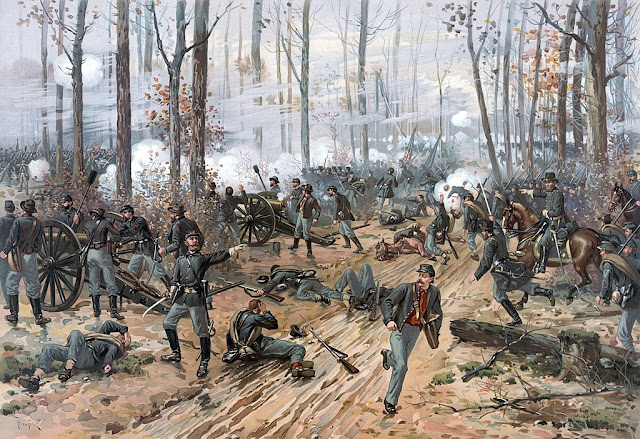April 6, 1862: Ulysses S. Grant meets Confederate troops led by Albert Sidney Johnston at the Battle of Shiloh
During the winter of 1862, Union General Ulysses S. Grant campaigned in the Confederate stronghold of Tennessee. Tennessee was important to the Confederacy because of its proximity to the Mississippi River, which was a highway for Confederate supply and transportation. Grant had been a lowly clerk in Galena, Illinois only a year ago, and now he was at the head of the Union's efforts in Tennessee. He had won important victories at Forts Henry and Donelson, while other Union generals suffered defeats in the East. During that winter, the Confederates under the command of Albert Sidney Johnston established a base at Corinth, Mississippi. They chose Corinth because it lay the conjunction of two, key railroads, and for its very defensible position with the Tennessee River to its rear. In April 1862, Grant's army was poised to attack Corinth. Grant's army arrived on the opposing bank of the Tennessee River on April 5th. He decided to make camp while he waited for Don Carlos Buell's army to join the attack on Corinth. On the morning of April 6, Johnston launched a surprise attack on Grant's surprised army, beginning the Battle of Shiloh.

 The Confederate attack swarmed into the Union camp, almost overwhelming
Grant's men. A majority of the fighting occurring in a placed called the
"hornet's nest," so called due to the intensity of the fighting.
Grant's forced continued to be pushed back, however, he realized that if he
could just last the night, his army would be reinforced by Buell's and he could
win the day. He ordered General Benjamin Prentiss to maintain his line. During
the ensuing melee, General Johnston was killed, and General P.G.T. Beauregard,
the captor of Fort Sumter, gained command. Throughout the day, Prentiss's line
held and the fighting subsided by nightfall. The following day, Buell's army
arrived, and Grant counterattacked. The Confederate troops could not handle the
newly bolstered Union forces and fell back to Corinth.
The Confederate attack swarmed into the Union camp, almost overwhelming
Grant's men. A majority of the fighting occurring in a placed called the
"hornet's nest," so called due to the intensity of the fighting.
Grant's forced continued to be pushed back, however, he realized that if he
could just last the night, his army would be reinforced by Buell's and he could
win the day. He ordered General Benjamin Prentiss to maintain his line. During
the ensuing melee, General Johnston was killed, and General P.G.T. Beauregard,
the captor of Fort Sumter, gained command. Throughout the day, Prentiss's line
held and the fighting subsided by nightfall. The following day, Buell's army
arrived, and Grant counterattacked. The Confederate troops could not handle the
newly bolstered Union forces and fell back to Corinth. The Battle of Shiloh resulted in a Union victory. Even though the
battle was fought in a place called Pittsburg Landing, it is named after a
church that resides on the land of the battlefield. Ironically, the word Shiloh
in Hebrew, means "place of peace." Grant was now poised to take
Corinth but the initial casualty reports had reach Union commanders and they
were not happy. The press called it a massacre, and clamored for Grant's
replacement. Under immense public pressure, Grant was replaced by Henry
Halleck, a rival of his. However, this would not be the end of Ulysses Grant's
career. He would go on to capture the key Confederate city of Vicksburg,
closing the Mississippi to the Confederacy for the duration of the war. His
victories would find him put in overall command of Union forces, bringing the
war to end in 1865 with his defeat of Robert E. Lee's Army of Northern
Virginia.
The Battle of Shiloh resulted in a Union victory. Even though the
battle was fought in a place called Pittsburg Landing, it is named after a
church that resides on the land of the battlefield. Ironically, the word Shiloh
in Hebrew, means "place of peace." Grant was now poised to take
Corinth but the initial casualty reports had reach Union commanders and they
were not happy. The press called it a massacre, and clamored for Grant's
replacement. Under immense public pressure, Grant was replaced by Henry
Halleck, a rival of his. However, this would not be the end of Ulysses Grant's
career. He would go on to capture the key Confederate city of Vicksburg,
closing the Mississippi to the Confederacy for the duration of the war. His
victories would find him put in overall command of Union forces, bringing the
war to end in 1865 with his defeat of Robert E. Lee's Army of Northern
Virginia. 



Comments
Post a Comment